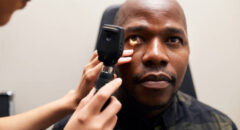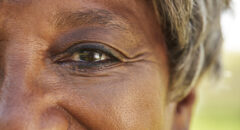
According to several studies, up to 80 percent of people who wear contact lenses have slept in them at least once. While some don’t experience any eye issues afterward, that doesn’t mean it isn’t a risky practice. In fact, doctors recommend that you don’t even take a short nap with contact lenses in because you could face severe consequences.
What Happens When You Sleep With Contacts In
Your eye’s surface is extremely sensitive so keeping in contact lenses while you sleep means prolonged contact between the two. This can lead to irritation, scratches, and an infection. Researchers further suggest that keeping in your lenses for too long could even affect the shape of your eyes. Another issue you may face is the lack of oxygen exposure to your eyes while sleeping. While the design of contact lenses has been improved over time to allow for better oxygen flow, this hasn’t resulted in a reduction in infections.
A third thing to bear in mind is how contact lenses affect your tear film. Without these lenses, the tear film removes debris and moisturizes your eyes when you blink. When you’re wearing contacts, they can inhibit the effectiveness of your tear film but eye drops can help. Since you aren’t blinking in your sleep, however, there’s time for debris to collect and germs to grow.
Finally, contact lenses can make it easier for microorganisms to grow and spread while you sleep. These microorganisms can come from incorrect storage of your lenses or not washing your hands before putting your lenses in. While you can reduce your risk by only putting your lenses in with clean hands and cleaning your contacts correctly, it will never drop to zero.
How it Could Affect You
The problems listed above can result in several eye issues that you need to see a doctor about. For example, you may develop conjunctivitis, corneal ulcers, or a condition that significantly reduces the flow of oxygen to your eyes known as corneal hypoxia. You can also get infections from bacteria, viruses, fungi, and parasites but the most likely is bacterial keratosis. The symptoms of bacterial keratosis include watery eyes, itchiness around the eyes, discharge from the eyes, eye pain, sensitivity to light, and blurred vision.
In more extreme cases, an infection can lead to vision loss. Sometimes, this can be alleviated with surgery but you may never have the same level of acuity again. Additionally, sleeping in your contact lenses may change the shape of your eyes in a way that prevents you from wearing them in the future.
RELATED: Contact Solutions: 10 Tips To Care For Your Lenses (And Eyes!)
What to do After Sleeping in Them
If you’ve slept in your contact lenses, it’s important to get them out as soon as possible. Sometimes, they’re easy to remove but others may dry out or stick to your eyes. In the case where they’re hard to remove, it’s best to use eye drops that are approved for use with contact lenses to hydrate your eyes first. Once you’ve done that, blinking repeatedly should help to loosen the lenses. You can help the process by gently massaging your closed upper eyelid. This should be enough for you to remove the lenses easily.
It’s best to store the contact lenses for a day or two after taking them out. This gives you time to ensure that no damage has been done to your eyes. If your lenses are corrective, then you should wear glasses during this time. In case you notice any changes in your eyes, it’s best to visit your doctor for an eye exam to check for irritation or infection.
Best Tips for Avoiding the Problem
While a high percentage of people have slept in their contact lenses, many of them do that accidentally. The best way to avoid this is to include removing your lenses as part of your bedroom routine. You can tie it to an activity you would never skip such as brushing your teeth or showering. If this doesn’t work for you, it may help to set an alarm on your phone to remind you to take them out.
Once you’ve taken them out, place them in their storage case for the night. If you were wearing daily contact lenses, then you can discard them.
If you’ve slept in your contact lenses before, you have a lot of company. However, everyone who does it puts their eyes at risk of infection and damage. It’s best to avoid sleeping in them but if you do, you should watch for any signs of infection and see a doctor if you need to.









